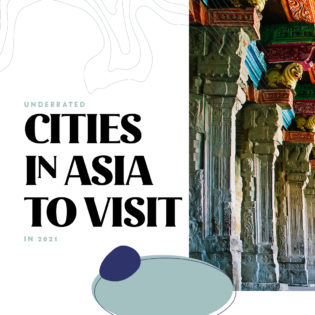At Cut X Dignity, a simple haircut can help to change lives
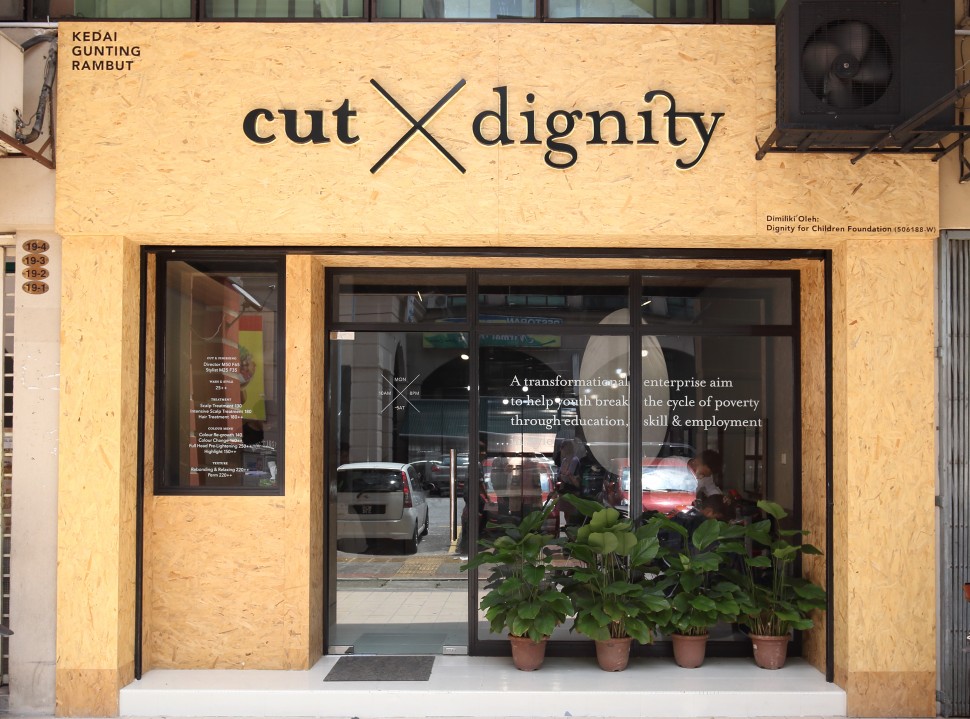
Cut X Dignity in Sentul, Kuala Lumpur may look like your regular hair salon, but this is no ordinary establishment.
Walk into the place on a Wednesday or Thursday afternoon, and you’ll be attended to by 10 student apprentices from the Dignity for Children Foundation, a non-profit organisation that runs a school for poor and marginalised children and youths.
As part of a six-month course, the 16- to 18-year-olds provide services such as haircuts, blow dry, hair wash, and colour and styling, under the watchful eyes of their trainers. The course falls under the school’s Skill Training Education Programme, in which students commit two days to learning a skill, on top of their regular math, science and language classes. All proceeds are channelled back into the foundation.
As the salon is newly opened, clients are mostly friends and family – but the place is seeing a steady increase in customers through word of mouth or simply curious passers-by.
At the helm of this transformational enterprise is project manager Lex Low, a professional hairstylist with over 15 years of experience. Three years ago, Low was at a crossroads in his life. “I was on the verge of giving up on my career as I felt like I had no purpose. I wanted to do something different and contribute more with my skills,” he explains.
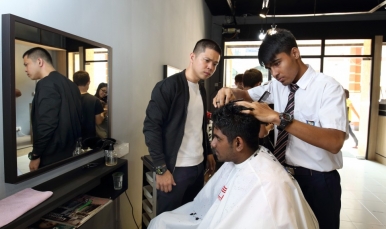
Volunteering his expertise, he pitched the idea of organising free hairdressing classes for students of the foundation, and raised funds through his blog to purchase basic equipment. Low recalls his first class in a “dingy makeshift classroom”, with just eight students. Cramped into a tiny space, the students had to make do with portable mirrors propped up against the wall on desks.
Today, thanks to seed funding from Bursa Malaysia, Malaysia’s stock exchange, students have a proper space to hone their skills.
Senior student Aisyah*, who completed a six-month course last semester, says: “I wasn’t interested in hairdressing initially, but I now have a passion for it! Having to deal with customers has helped me improve my communication and problem-solving skills.”
Aisyah has expressed her wish to get a job at a salon after graduating from school. “I think the most important thing I’ve learnt from this isn’t just hairdressing, but that if I start something, I shouldn’t give up easily and I should see it through the end,” she says.
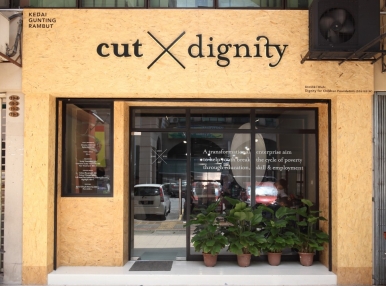
Laila*, another student, enjoys learning about the different types of hair and how to cut it to suit a person’s head or face shape. When asked if she would consider hairdressing as a career, the bubbly 17-year-old refugee from Somalia, who has been in Malaysia since 2011, says she wouldn’t pass up the opportunity if it comes around, although she dreams of becoming a lawyer someday.
Some of the 60 students who have graduated from Low’s classes in the past few years have moved on to bigger things with the skills they’ve acquired. “We had a student here who was a school dropout, hung out with the wrong crowd and was aimless as to what she wanted to do. Today she’s working as a professional hairstylist and is doing well,” says Low. Others have moved overseas and applied their hairdressing skills to benefit their respective communities.
Running such a setup can be challenging, and for Low, the hardest thing is managing his time. “I manage a business and also other social projects, so it’s difficult for me to juggle my time. I do training programmes with the Orang Asli (indigenous community), ex-convicts and ex-drug addicts, so I’m only here a few days every week,” he says.
Thankfully, the salon has director Bill Puah overseeing things, along with two junior stylists. Puah himself is a professional stylist with seven years of experience at a hairstyling academy, before he decided to join the venture. “Watching Lex and his passion for making a change really inspired me, so I took a leap of faith,” Puah shares.
The salon is the latest addition to a line of social initiatives run by the Dignity for Children Foundation, and part of the grand vision that its founder, Reverend Elisha Satvinder, has for the school. “We want our students to learn valuable life experiences, beyond the usual subjects,” says Elisha, who hopes to have a holistic learning centre and what he calls an “educational youth village” for his students.
Aside from the salon, the foundation also manages a herb garden, a bakery-cum-café, a woodwork centre and a sewing gallery, all run by students as part of their school curriculum. The establishments are located within close proximity of each other in a commercial area in Sentul.
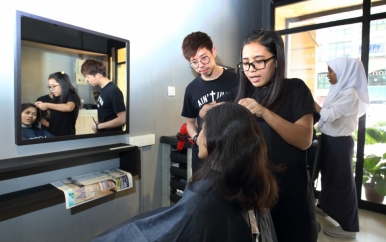
“Students learn how to deal with real customers and what it takes to give good service. The best part is, money spent at these establishments or proceeds from the products sold go back into the foundation and inadvertently, their own education,” Elisha points out.
Plans are in the pipeline for a bed and breakfast in the area, where students can be trained in hospitality and the culinary arts. So far, the foundation has seen close to 10,000 people walk through its doors since it was started 19 years ago.
“We’ve had success stories, like Rahman*, one of our Rohingya refugees who is now at Monash University on a scholarship. When he first came to us at 10 years old, he could barely read or write. Today, he speaks fluent English and is inspiring the younger generation in his community,” says Elisha. “There are students who have broken the cycle. They are transforming their own communities, because they are living proof that education can change their lives,” he adds.
At the end of the day, what Elisha hopes for is to be able to empower youths and children by making them see the value of their work. “You may be sitting there enjoying a haircut, but as you are having your hair chopped off, you are helping to chop off the hold poverty has over their lives and inspiring them for success,” he adds.


